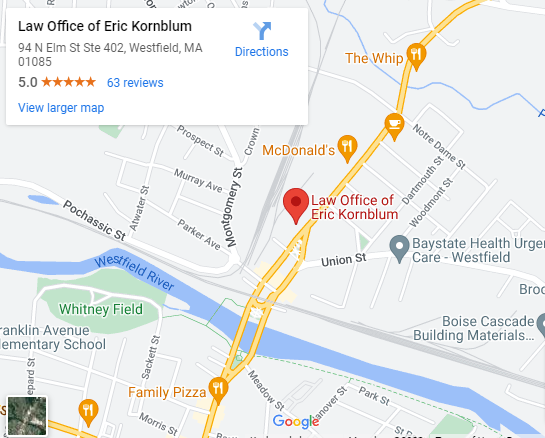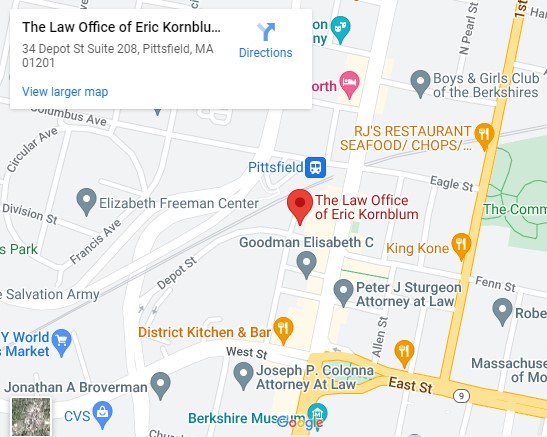Westfield Chapter 7 vs Chapter 13 Attorney
Individual debtors can choose from two chapters when they file bankruptcy: Chapter 7 vs Chapter 13. Chapter 7 is a complete discharge of any past debt of the debtor, excluding certain debt that is considered non-dischargeable. Chapter 13 is a reorganization of the debtor’s debt. Both chapters can be beneficial in the right situation. A Westfield Chapter 7 vs Chapter 13 lawyer can help answer any questions you may have!
Has your credit card debt been stressing you out?
Are you worried about paying off your student loans and medical bills?
At the Law Office of Eric Kornblum, we are dedicated to helping people end the stress of spiraling financial obligations. If you’re ready to eliminate the stress, pick up that phone and schedule a conversation with us!
Primary Differences: Chapter 7 vs Chapter 13
The biggest difference between the two is the time each chapter requires. A Chapter 7 liquidation is a much quicker process than a Chapter 13 reorganization. The timeline of a normal chapter 7 case is 3-4 months as opposed to 3-5 years for Chapter 13.
The timeline difference also helps explain the next biggest difference between the two chapters: cost. A Chapter 7 bankruptcy will normally be significantly cheaper for the debtor than a Chapter 13 bankruptcy. Chapter 7 is to release the debtor from their financial obligations, barring any non-dischargeable debts or money owed to the court due to too much equity in their assets. Chapter 13 has two goals: reorganizing the debt and ensuring that creditors recover something in the process.
Chapter 13 attorney fees and court costs are also much higher. If the debtor does not have consistent income, they are probably better off filing a Chapter 7 because of the cost.
Income
Another difference between the two bankruptcy chapters is that a debtor has to qualify for Chapter 7. Chapter 7 uses debtors’ income over the previous six months as a baseline to determine whether they qualify for Chapter 7 vs Chapter 13. Bankruptcy Chapter 13 is an option every debtor can choose, regardless of their income.
Chapter 7’s primary purpose is to rid the debtor of their unsecured debt and other debt that is dischargeable. Chapter 13, due to being more concerned with a reorganization, has other benefits that can be fruitful to the debtor. Chapter 13 can toll interest on certain debts that can’t be discharged in Chapter 7, such as certain back taxes and student loans. In addition, Chapter 13 may modify car loans in “cramdowns.” In Chapter 7, on the other hand, creditors do not normally adjust their loans.
Foreclosure
One difference between Chapters 7 and 13 is the ability to save your home. In Chapter 7, a debtor who is behind on their mortgage will have significantly more trouble trying to save their home from foreclosure. The process in Chapter 7 is too fast for any meaningful modifications or pay downs of arrearages to occur. While filing Chapter 7 will enact the automatic stay, which freezes creditors from collecting, the timeline of the stay is normally no longer than four months. Furthermore, an aggressive creditor can shorten the stay if they understand bankruptcy laws.
However, Chapter 13 is the perfect chapter for a debtor in foreclosure to consider. The Chapter 13 process is a 3-5 year process. This process allows the debtor to enter into a mortgage modification mediation program. This program differs from the normal modification process in that the court monitors the modification. Also, an online portal files all relevant documents. This helps keep the modification process organized.
The modification has a much higher chance of succeeding in Chapter 13. Normally, the mediation process involved in mortgage modification mediation will lead to an agreement between both sides. It is impossible for a debtor to do this in Chapter 7, so most debtors who want to save their homes and are in foreclosure choose to file Chapter 13.
Keeping Assets
Finally, the asset protection strategy differs from Chapter 7 vs 13. In Chapter 7, a debtor with assets that have too much equity will have to make a difficult choice. They will have to either pay the amount that is non-exempt or surrender the property to the court. If they choose to buy back the asset(s), they will have to pay the sum back in 3-12 months.
If the non-exempt equity is too high, most debtors will be unable to pay it and thus will lose their property. In Chapter 13, the non-exempt equity amount is added to the amount the debtor has to pay back over the course of 3-5 years. Most debtors may afford to keep these unprotected assets when given an extended period of time.
Start Living Worry-Free Today!
Eric has been helping clients discharge their debts for over 20 years. If you need help with filing bankruptcy, negotiating debts, avoiding foreclosure, and keeping your properties, you’ve come to the right place. Talk to us. We’re ready to listen!
How Can a Westfield Bankruptcy Attorney Help Me?
The US bankruptcy code provides Americans with an excellent option for debt relief. You may think you can save some bucks by skipping the attorney. However, that can be a big mistake. If there’s anything wrong with your bankruptcy filing, the bankruptcy court might dismiss your case. If the mistake is very egregious, they might think you’re committing fraud.
Are you willing to take that risk and figure out bankruptcy filing yourself? Of course not. Allow our experienced Westfield bankruptcy lawyer to help you, from petitioning and figuring out bankruptcy exemption to discharge. Legal advice from our attorney has helped many clients experience bankruptcy relief and a fresh start!
If you’re ready to eliminate your overwhelming debt, call our Westfield law office to discuss your bankruptcy case!
Contact a Bankruptcy Lawyer Who Cares to Learn More
Every debtor should examine the differences between the two chapters of bankruptcy carefully before filing. Contact an experienced bankruptcy lawyer to learn more about your options.

 MA bankruptcy lawyer Eric Kornblum graduated from State University of New York, Binghamton in 1989 and received his law degree in 1992 at Western New England College, School of Law. Since opening his own practice, Eric has been dedicated to helping his clients resolve their financial problems both in and out of court.
MA bankruptcy lawyer Eric Kornblum graduated from State University of New York, Binghamton in 1989 and received his law degree in 1992 at Western New England College, School of Law. Since opening his own practice, Eric has been dedicated to helping his clients resolve their financial problems both in and out of court. 
